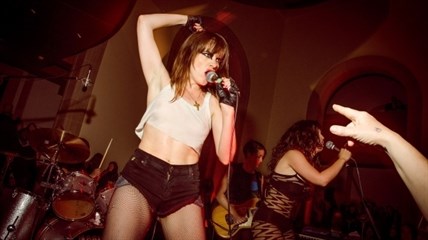
Vag Halen lead signer Vanessa Dunn performs show on June 6, 2013 in Toronto, in a handout photo.
Image Credit: THE CANADIAN PRESS/Handout, Alejandro Santiago
March 23, 2014 - 2:26 PM
TORONTO - Clutching the microphone in her leather-gloved hand, Vanessa Dunn strutted onstage with wild abandon, crouching toward the swaying crowd as she wailed about giving "every inch" of her love.
A beat later, the frontwoman for Toronto's Vag Halen whipped off her tank top to belt out the rest of Led Zeppelin's Whole Lotta Love bare-chested.
Inside the Art Gallery of Ontario, where the show was held last June, the crowd roared its approval.
For Dunn, the gesture felt "incredibly natural," she said in a recent interview — nothing more than what male rock stars have done for decades without anyone batting an eye.
But even a casual move can sometimes send a powerful message, the singer discovered after receiving a letter from a fan.
"This woman was telling me there was just this energy that happened in the room that was like ... 'We could do that, too. Someone just did what all of us want to do,"' she said.
"That's what I've heard more, that when they see me up there and all of us up there doing what we do onstage, it's more like, 'Oh, it's for the taking, I can do that."'
A rising star on the burgeoning scene of all-female cover and tribute bands — the group played at the Venice Biennale last May — Vag Halen makes no bones about reclaiming rock and roll's traditionally male, heterosexual voice.
It's a way of making peace with beloved but often problematic hits from rock heavyweights such as Led Zeppelin, Guns N' Roses and the band's namesake Van Halen, Dunn said, while creating more space for women in an industry where they still face significant barriers.
"It's using the gun that was pointed at you back on somebody else," she said.
The movement has drawn high-profile praise, including from pop culture writer Chuck Klosterman, who once wrote that the American group Lez Zeppelin might be "the most powerful all-female band in rock history."
And Sheezer, a Toronto mainstay in recent years, got Weezer's stamp of approval when lead singer Rivers Cuomo mentioned the band in a tweet.
Yet some in the scene are less eager to draw attention to the politics surrounding their act, though they acknowledge it's impossible to skirt the issue entirely.
"All-female bands are not as common as all-male bands," and inevitably stand out as a result, said Carly Beath, lead singer of the Toronto-based Nirvana tribute band Hervana, which had its first show this month.
The group came together last year, its members all accomplished musicians in their 30s who "just happen to be women" and don't want to be defined by their gender, Beath said.
Many all-female tribute bands deliberately choose groups with misogynist lyrics, but Hervana's source material already has a feminist slant, so it's more a matter of celebrating rather than reclaiming it, she said.
"Nirvana songs are the songs I first learned to play when I was learning guitar, so we thought it would be fun to go back to the songs we started with," she said.
The same goes for Sheezer, whose main goal is to have fun playing music they love, the band's agent Jen Rogers said.
Dunn argues women-only tribute bands can't help but be subversive, whether they intend it or not.
"If you're going to do covers and choose an all-male catalogue ... that's inherently feminist," she said.
That the message comes in a fun, energetic performance helps explain the appeal, said Ken McLeod, an assistant professor of history and culture at the University of Toronto.
"It's managing not to take itself too seriously" while delivering a mix of critique and homage, he said. "It's fun and political at the same time."
Women have only recently had access to the technology, lessons and support needed to break into rock music, said Susan Fast, a researcher at McMaster University.
Fast, who has studied American all-female tribute bands including Lez Zeppelin, Iron Maidens and the Ramonas, said the majority are "huge fans" of the music they cover.
"Their way of expressing their fandom is learning to play the music really well, rather than the traditional female expression of fandom, which is imagining themselves with the boy — being a groupie," she said.
All the band members she interviewed also performed original songs with other groups, but found "the industry can't really hear it," she said. "They have to prove themselves by playing this music."
Some who come to shows for the novelty of seeing women play rock and roll or heavy metal leave "amazingly surprised" at the musicians' skills, but others can't see past gender and simply objectify them, she said.
"There's something titillating to a straight male audience to seeing women doing this kind of music," she said.
Vag Halen has seen its share of backlash, Dunn said. Some have questioned the band members' morals or even threatened sexual assault, she said.
But there has also been an outpouring of support, she said. The singer recalled being approached in a bar by a woman who called Dunn a role model for her daughter.
"There's something polarizing about what we're doing," she said.
"It's 2014, and it's still a big (expletive) deal when I take off my shirt."
News from © The Canadian Press, 2014